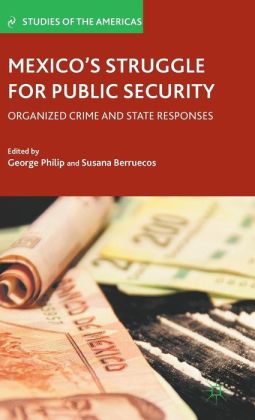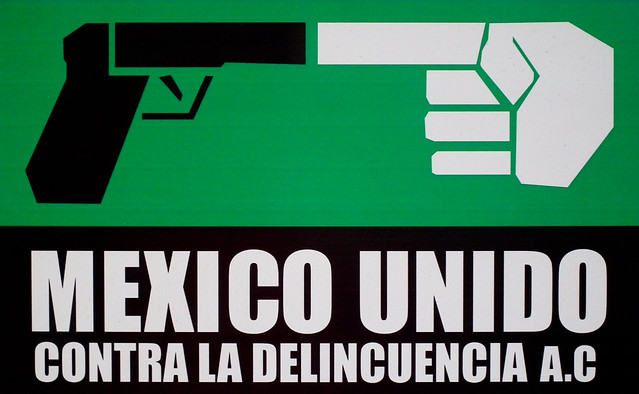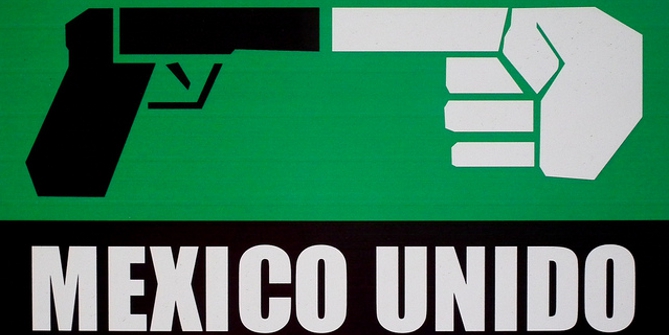 Mexico’s criminal gangs are a real challenge to the state, and so far government policies aimed at combating that threat have not been very successful. This collection, edited by George Philip and Susana Berruecos, poses that organized crime is best combated by institutional reforms directed at strengthening the rule of law and winning over public opinion rather than by a heavy reliance on armed force. While some contributors offer useful detailed descriptions of government reforms, Chris Birkbeck wonders if others have succumbed to phantoms created by media perceptions.
Mexico’s criminal gangs are a real challenge to the state, and so far government policies aimed at combating that threat have not been very successful. This collection, edited by George Philip and Susana Berruecos, poses that organized crime is best combated by institutional reforms directed at strengthening the rule of law and winning over public opinion rather than by a heavy reliance on armed force. While some contributors offer useful detailed descriptions of government reforms, Chris Birkbeck wonders if others have succumbed to phantoms created by media perceptions.

Bodies hanging from bridges and human heads left outside municipal offices have a rich and gruesome semiotic power. Not the typical murder, they thrust themselves onto the collective consciousness and clamour for a response. While more ordinary crimes and perceived levels of ‘insecurity’ (the Latin American term of preference) may figure quite prominently as political issues, dramatic violence demands political action. Where Hugo Chávez could, except for one high profile kidnap-murder, largely comport himself for 14 years as if Venezuela’s elevated crime rates did not exist, Mexico’s politicians have had to bite the bullet and stake their performance ratings on doing something about crime. As a result, much discursive energy has been expended on their intentions, plans and results. This edited volume offers a useful and representative sample of that discourse.
As the Preface indicates, the substantive chapters derive from presentations at a conference organized by the LSE in March 2011 to discuss Mexico’s ‘so-called war against organized crime.’ This was the penultimate year of presidency for Felipe Calderón, who had used that bellic trope consciously and prominently since the start of his term. Contributors to the book write from a variety of perspectives – as academics or bureaucrats, as Mexicans or international observers – but, some historical background aside, all of them focus quite squarely on the contemporary moment. Collectively, they seek to contextualize Calderón’s policies by examining a variety of topics that could be assembled from the authors’ specialist knowledge, such as the militarization of public security, human rights, criminal justice reform, even the bureaucratic reorganization of government statistics. Overall, they are less interested in developing a detailed evaluation of those policies than in offering a less direct critique by emphasizing the ‘complexity’ and ‘multidimensionality’ of this policy field, traits which – if present – belie simple recipes for action.
The adversary in this ‘struggle’ is organized crime which, while much talked about in the book, is a murky phenomenon hinted at by the apparent epiphenomena of corpses and violent folklore. Organized crime is held responsible for 30,000 murders between 2006 and 2010, possibly rising to 66,000 by the end of Calderón’s term in 2012. This would be sufficient testimony to the size of a problem, if only the numbers could be validated. Thus, Piccato (Chapter 3) makes the important point that ‘we cannot be sure about the criminality of victims or murderers as few cases are actually investigated and solved’ (p. 48). Unfortunately, he does not explore this matter in detail and neither does any other contributor, not even Palma (Chapter 7) who writes about the recent data collection efforts of the Mexican government. As it is, most commentary is constrained to rely on press reports, including Guerrero’s intriguing contribution (Chapter 2) on the effects of Calderón’s campaign against organized crime, in which he argues that the arrests of cartel leaders have led to increased, rather than reduced, levels of violence. How far the contributors to this volume were jousting with phantoms created by popular and media perceptions is not clear.

Organized crime is something of a paradox, for its economic nature requires some sort of permanent operation while its markets among otherwise conventional segments of the populace mean that it is only half submerged from view. It is not too difficult for the police or researchers to find it, although each may have their reasons for not wanting to look. One consequence of this, of course, is the sense, if not the plain certainty, that organized crime and the agencies for its control co-exist and may develop mutual accommodations. This is the fear that organized crime penetrates the state and subverts or neutralizes it for its own ends, a fear that in Mexico has led to the deployment of the military in the ‘fight’ against it. As López-González (Chapter 4) outlines in useful detail, certain matters of public security have been militarized in Mexico since at least 1989. Landman (Chapter 5) sees this not as a separate development to the discourse on the ‘war’ against crime but as a natural consequence of it, and highlights the negative consequences for human rights. Nevertheless, the climate of urgency around organized crime and the generally higher esteem in which the armed forces are held, compared to the police, lend a greater sense of efficacy to the military response. And, in a federal nation such as Mexico, the President can more effectively direct the military than any part of the criminal justice system. Thus, in 2008 Calderón’s government undertook a far reaching reform of criminal justice, most notably introducing a more adversarial process. As Ingram and Shirk report in some detail (Chapter 6), the implementation of these reforms at state level has been very uneven indeed.
Ingram and Shirk’s chapter is a very good example of the increasing capability for systematic data collection on at least some aspects of crime and justice in Mexico. Similarly, routine victim and public opinion surveys, conducted by government or NGOs, now provide much more information than was available 20 years ago. They underpin the growth in policy-related studies that brings together researchers and bureaucrats and which leads to the collective reflection set out in this book. The key questions considered by the authors relate to what is being done, or should be done, not to problems of knowledge. There is no attempt to step back from the perceived imperative of action to think more broadly, conceptually and comparatively about what all of this means. But politicians, the media, the public and many researchers would argue that bodies hanging from bridges require urgent attention, and we would be hard put to deny that they have a point.
Please read our comments policy before commenting.
Note: This article gives the views of the authors, and not the position of USApp– American Politics and Policy, nor of the London School of Economics.
Shortened URL for this post: http://bit.ly/HMEnhn
—————————————–
 Chris Birkbeck – University of Salford
Chris Birkbeck – University of Salford
Chris Birkbeck is Professor of Criminology at the University of Salford and Emeritus Professor of Criminology at the Universidad de Los Andes, Venezuela. His research focuses on crime and criminal justice in Venezuela or, for some topics, the Americas. His monograph Collective Morality and Crime in the Americas was recently published by Routledge. Read more reviews by Chris.



